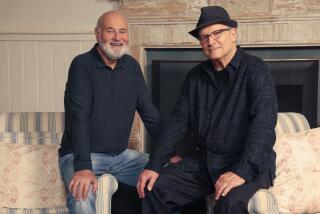HAL HOLBROOK’S TWAIN TALKS TO 20TH CENTURY
- Share via
Although Hal Holbrook has played a great variety of roles over his career, ranging from Don Quixote in “The Man of La Mancha” to a homosexual father in TV’s “That Certain Summer,” there is an unmistakeable signature to everything he does. He has a circumspect, solitary, thoughtful, avuncular quality, typified best perhaps in his role as the Stage Manager in “Our Town,” where his philosophical smile was tinged with melancholy as he popped open his pocket watch to check the early hour of the American century’s rolling in.
Next to Henry Fonda and Gary Cooper (in whose lean, quiet company John Wayne seems contrastingly bellicose), Holbrook seems peculiarly of a traditional American grain, someone a little older than his chronological age. It seemed natural therefore that Holbrook should take so well to another figure who played old while remaining forever contemporary--Mark Twain.
Holbrook has been playing Twain officially for 30 years, and the matchup is so good that he’s been a reference point for how well other actors play one-man roles. That hasn’t been lost on the State Department either, which recently commissioned him to take Twain on the road again through England, Western and Eastern Europe, Israel and New Delhi.
“The actual figure is 31 years, if you count the first time I did Twain,” recalled Holbrook recently, before embarking on the tour.
“It was an honors project for my senior year at Denison University. I was 22, and did it with my first wife (Ruby). It was so well received that we played it for five years in 330 schools. After she got pregnant, we went to New York, where I read up more on Twain, and was inspired to do it again by seeing Emlyn Williams do Charles Dickens.
“George Bernard Shaw called Twain ‘America’s Voltaire.’ I can feel that more and more over the years. And I feel more restful playing him, more free to say things through him about what’s going on in the world.”
Sometimes the playing of Twain has had small historic reverberations that go beyond performance. “I once played a date in Little Rock, Ark., and did the Colonel Sherburn speech about the cowardice of lynch mobs. A woman came up to me after and said, ‘You gave us a better sermon than we get in Sunday School.’ I realized that I really had a way now to say things, to get into deeper, tougher stuff about racial injustice, religious fraud, stupidity.
“During the civil rights strife in the South, it seemed I was always arriving at places just after something had happened, like Birmingham, Ala. One of the most remarkable incidents was at Oxford, Miss., when James Meredith was trying to integrate the university. The atmosphere was so tense that they canceled a football game, but not my performance. There were soldiers and machine-gun emplacements outside.
“I called my agent to make sure I was still supposed to go on. I saw that I was a guinea pig: I was the first thing the school officials were allowing audiences to integrate for. I told ‘The Silent Lie’ story, where Twain says that the worst lie is the lie of silence. That was the only time I ever got applause for that passage in the show. Except once--in Hamburg, Germany.”
If it could be said that an actor carries his culture in his attitudes and physique every bit as much as he does in the choice of his material, Holbrook’s lean figure seems to contain an apprehension of the often sorrowful and lonely eccentricities beneath the surface cheer of American life.
Early in his conversation, Holbrook said, “My family goes back hundreds of years. I can play old, or appreciate old, because my grandfather brought me up. He was a tall, strong, tough man who came from nothing and made a big success in business.”
Later he added, “I was born in Cleveland, but raised in New England. My father and mother left me when I was 2. My mother disappeared in 1936--simply took off. My father I never heard from until a few years ago, when I ran across him by accident in San Francisco while I was making ‘Magnum Force.’ We met for lunch one afternoon. He’d been a hobo. He rode the rails, tramp steamers. He was a survivor, a jungle cat. He died a year and a half ago at the age of 80.”
Over the past years, Holbrook has become a sailor, often sailing alone to places like Hawaii, Tahiti, Pago Pago, New Zealand and the Fiji Islands (he’s also taken his new, or newish, wife, Dixie Carter, on a South Pacific voyage). The solitary oceanic vistas seem linked with Holbrook’s long, imaginative attachment to Mark Twain, who, out of his own steamboat years, made the Mississippi the aorta of American artistic experience.
More to Read
The complete guide to home viewing
Get Screen Gab for everything about the TV shows and streaming movies everyone’s talking about.
You may occasionally receive promotional content from the Los Angeles Times.






